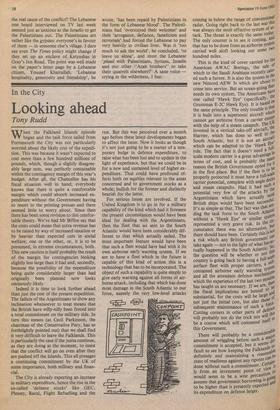The press
Israeli-bashing
Paul Johnson
W.4henever Israel responds to Arab terrorist provocation by large-scale military action, it can usually count on a milted reception from the British press. This time comment was mainly hostile, partly because of the scale of the destruction and the heavy civilian casualties, partly because Fleet Street likes Mr Begin less and less, and Partly (I suspect) because of persistent rumours that Israel is supplying scarce military material to the Argentines. The '011Y Telegraph, normally a staunch sup- Porter of Israel's militant peace-keeping methods, was plainly worried. 'As the scale Of the Israeli assault on the Lebanon becomes apparent', it noted last Friday, 'both its wisdom and morality must be call- ed. increasingly into question'. The paper sald it 'sympathised' with 'Israel's search for security' even if 'at times we are squeamish about her methods'. But it was not clear that Israel's integrity was being genuinely threatened' by the PLO in the Lebanon: 'All the evidence suggests that the ceasefire . was reasonably successful' and Israel had 'greatly exaggerated the ex- tent of PLO violations'. That, naturally, was the view of The 7, "nes which, though proprietors may come id .go, remains broadly pro-Arab. 'The i.a.ct,is that Israel is the aggressor in this eon- !bet w it snapped. Her claim to be acting in self-defence, to 'secure the safety of her copulation in Galilee' simply 'did not stand 13, The Times rejected the Israeli case Point by point. PLO shelling had been in response to Israeli acts of aggression. It been be, as Israel claimed, that there had , een 'more than 150 terrorist attacks since st July'. But it was a fact that 'most of these incidents occurred in the occupied ter- tdrles, that most of the victims were not Israelis, and that during the same period
quite a number of Palestinian civilians have been killed in the occupied territories by Israeli troops'.
Being shelled by Palestinians seems pretty remote to the chaps in Printing House Square: they are more likely to be blown up by Rupert Murdoch, on one of his periodic long-range raids from New York. Things look quite different in Galilee itself. Eric Silver, the Guardian's Jerusalem correspon- dent, quoted the views of one of its residents, Rachel Weinberg: 'The children have become very nervous, everything makes them jump and scream, even a spoon dropping. We try to run a normal life bet- ween shellings. The children try very hard to forget their fear, they do everything to seem normal. They play and they go to school but they know that somewhere it is waiting for them, that every day the Katyushas can come'. Silver felt that 'the people of the Galilee panhandle cannot be left to endure a repetition of the saturation barrages made possible by the Palestinians' `I'm interested in life membership.' new 130 millimetre cannon and multiple launchers'. Having visited some of these ex- posed settlements myself, I am quite sure Silver, rather than the gentlemen of The Times, is closer to reality.
Whether the scale of the Israelis' response was justified is, or course, arguable. Some papers have been building up Arik Sharon, Israel's defence minister, into a hate-figure second only to Begin. A Times profile, 'The Maverick Running Israel's War Machine', presented him as an expert in ferocious reprisals, creator of Unit 101 known as 'The Avengers': 'He met ter- rorism with well-disciplined, institutionalis- ed terrorism, matching outrage with outrage. In one notorious raid under his command, Unit 101 killed 69 Arabs, in- cluding women and children'. The same statement turned up in a Financial Times portrait of Sharon, with the additional in- formation that the women and children constituted 'half' of the total dead. It add- ed: 'His next ambition is to be Prime Minister of Israel', a prospect which 'fills many people in the Knesset and elsewhere with trepidation' since Sharon 'is not noted for his admiration of Western democratic process'.
As the week progressed, critics of Israel became angrier and less coherent. Foaming away at Israel's 'latest display of supreme arrogance and blind folly', one frantic Guardian reader prophesied 'the defeat of modernisation of the region' and — a King Lear touch, this — 'the collapse of economic and political systems in the world'. He thought that, since its founda- tion, Israel 'has been living a lie' and doubts were now being raised 'about the moral justification of Israel's existence'. This was 'the only thing that has prevented me from wanting the world to stop so that I could get off. In Saturday's Telegraph, Christopher Booker thought it all went back to the Old Testament and 'the hard legality which decrees revenge and the interchange of violence for violence'. The Jews had not only rejected Christ, 'a man who holds out to them a quite different vision of what life can be all about' but, 'right from the start', had 'hardened their hearts against the Palestinians'. The Times directed its fury against the Americans, for vetoing the Security Council resolution. But let me give their leader-writer a word of advice. If you begin your last paragraph with an editorial ultimatum, make sure you have at least the verbal means to make it plausible. 'Unless the United States', fulminated The Times, 'makes it clear that it cannot and will not support such a policy ...' Yes, yes: what
terrible things will happen to it? its credibility will be further reduced in the Middle East'. Oh. If that's all, it's a case of Carry On, Kirkpatrick.
Actually, in the haste to bash the Israelis and deplore the injury to the Palestinians, few papers bothered to inquire into the legality and morality of the PLO occupying by armed force and in permanence a huge chunk of Lebanese territory. Was not that the real cause of the conflict? The Lebanese one heard interviewed on TV last week seemed just as anxious as the Israelis to get the Palestinians out. The Palestinians are rather like the gypsies: everyone's in favour of them — in someone else's village. I dare say even The Times policy might change if they set up an enclave of Katyushas in Gray's Inn Road. The point was well made on the paper's letter page by a Lebanese citizen, Youssef Khairallah. 'Lebanese hospitality, generosity and friendship', he wrote, 'has been repaid by Palestinians in the form of Lebanese blood'. The Palesti- nians had 'overstayed their welcome' and their 'arrogance, defiance, fanaticism and terrorism' had forced the Lebanese to pay very heavily in civilian lives. Was it 'too much to ask the world', he concluded, 'to leave us alone', and must the Lebanese 'plead with Palestinians, Syrians, Israelis and our other "Arab brothers" to take their quarrels elsewhere?' A sane voice crying in the wilderness, I fear.





































 Previous page
Previous page